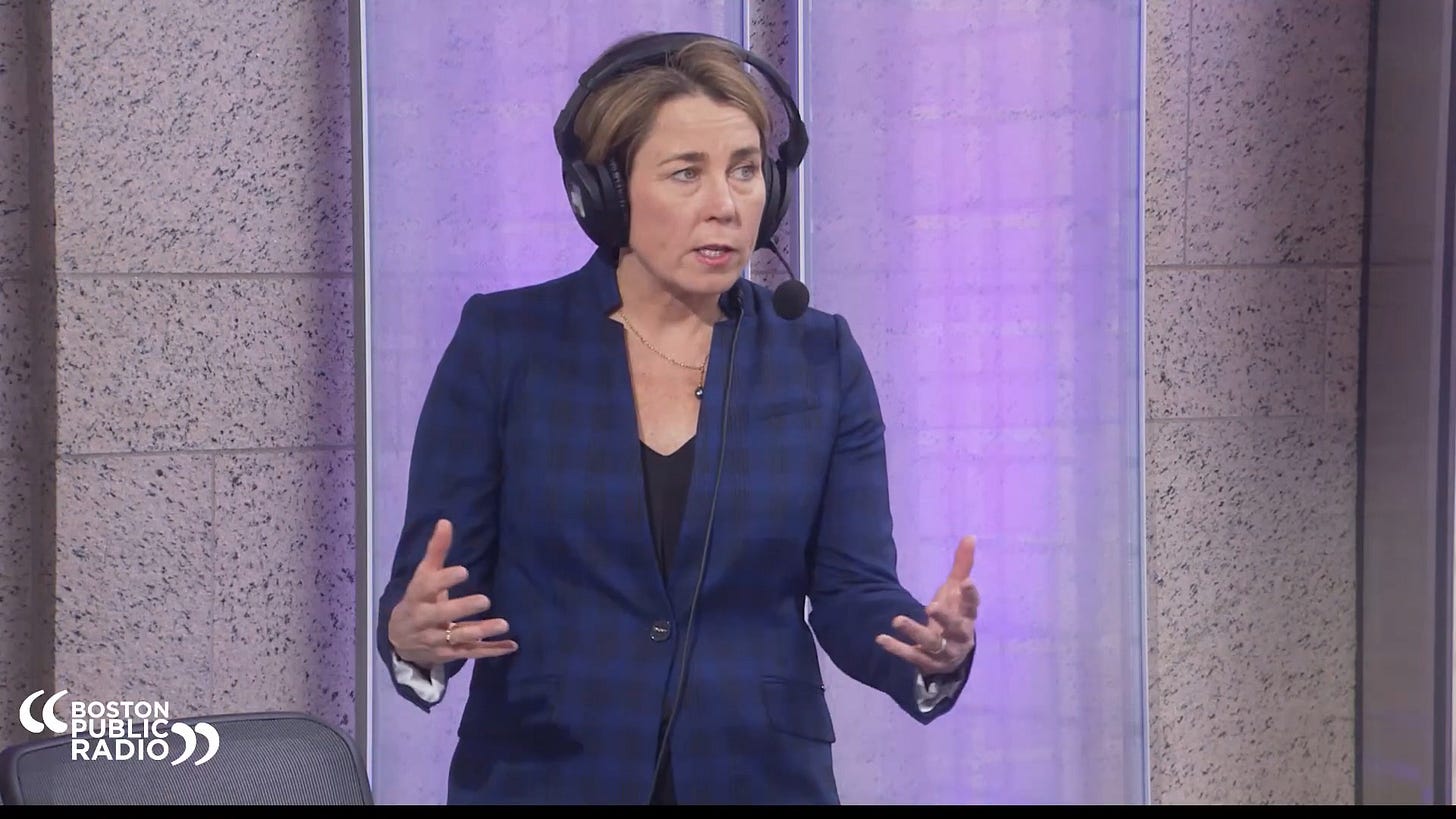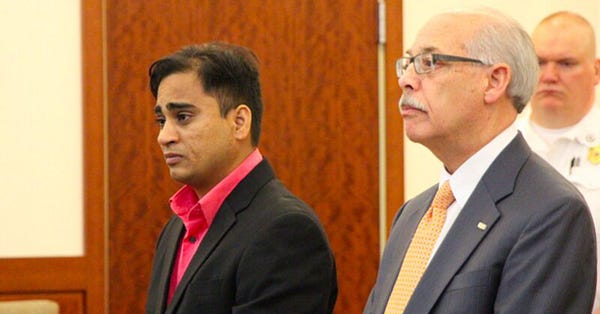Governor Healey brazenly lies about her transparency flip-flop
Governor Healey gaslights public after breaking promise to not claim her office is exempt from state’s public records law

Massachusetts Governor Maura Healey brazenly lied on Thursday, insisting that her office is not claiming a total exemption from the state’s public records law — even though the policy her office posted online says the opposite.
In December, just two weeks before Healey’s inauguration, she said on the GBH program Boston Public Radio that she would not claim her office is exempt from the law.
But she reversed herself shortly after taking office, issuing a policy that says the governor’s records “are not subject to the Massachusetts public records law” under Lambert, a 1997 Supreme Judicial Court decision that past governors have also used to claim immunity.
During a Boston Public Radio appearance on Thursday, a listener asked Healey about her broken promise.
“There are certain instances as governor where I’m not able to provide all information to the public, but I’m going to look to be the most transparent governor that the state has ever seen when it comes to documents,” Healey said.
She continued: “It’s also true that I stand by what I said and [sic] that I was not going to take a position that Lambert applies to everything, and I’m really trying to be consistent about that.”
Reacting to Healey’s comments, Adam Reilly, the host of the GBH program Talking Politics, tweeted: “Not keeping a promise is pretty standard, I know. But not keeping it while insisting you’ve actually kept it? That’s something else.”
Karissa Hand, Healey’s press secretary, disputed that Healey’s comments were untruthful.
“The governor has not claimed a blanket exemption to public records law,” Hand said. “Lambert is cited because it is still the law, but the governor has said she intends to voluntarily comply with public records law.”
However, the public records law requires government officials who withhold records to cite a specific exemption included in the law — such as the exemptions for personal privacy, ongoing policy-making discussions, and law-enforcement investigations.
The Healey administration has sometimes skipped this step, using Lambert as its sole justification for withholding records. Furthermore, the online policy says that the administration will consider the governor’s “unique obligations” when deciding whether to reject requests instead of relying only on the exemptions in the law.
The Healey administration rejected a Mass Dump request for emails and text messages from the Charlie Baker administration, saying its policy is to not release records from past governors. The administration cited only Lambert.
The state’s public records watchdog, Supervisor of Public Records Manza Arthur, denied an appeal by the Mass Dump because of the Healey administration’s reliance on Lambert.
The decision means that the public will be kept in the dark about information related to former Governor Baker’s response to the COVID-19 pandemic, safety problems at the Massachusetts Bay Transportation Authority, the drug-overdose crisis, the massive overtime-fraud scandal at the Massachusetts State Police, and other vital issues.
Arthur also cited the Lambert decision to deny an appeal from freelance journalist Jonathan Gerhardson. The records supervisor is currently mulling over four other appeals related to the governor’s office, one of which was filed by Boston Globe reporter Samantha J. Gross.
The Healey administration, citing only Lambert, rejected Gross’s request for call logs and correspondence with the leaders of the state Legislature. The administration did provide the journalist with a copy of Healey’s calendar but redacted information dozens of times under an exemption for security-related documents like blueprints and schematics.
Gross’s appeal argues that because the Healey administration cited “an established exemption in public records law” to justify redacting the calendar, Arthur has the authority to review the matter.
Hand said that the administration’s response to Gross was evidence that Healey isn’t claiming to be completely exempt from the law.
“Our office has provided responsive records that could have been exempted under Lambert, including providing the Globe with the governor’s calendar,” she said.
However, the core purpose of the public records law is that it generally requires government officials to release records even when they do not want to do so.
The Healey administration’s practice — releasing records when it wants but citing Lambert when it doesn’t — is the same approach taken by past governors.
In 2022, during Healey’s campaign for governor, her spokesperson told the State House News Service that she supported making the governor’s office subject to the public records law “in the interest of transparency and accountability.”
In 2015, during another Boston Public Radio appearance, cohost Jim Braude asked Healey if she thought the governor, Legislature, and judiciary should be exempt from the law.
“I don’t think that any branch should be categorically exempt from public records law,” Healey responded. “I think that there may be appropriate and indeed needed exemptions that should apply, but we can craft those.”
There are currently three bills before the Legislature aimed at expanding the scope of the public records law:
A bill by Senator Michael Brady would apply the law to the governor. The bill is supported by Secretary of the Commonwealth William F. Galvin, who is responsible for appointing the supervisor of public records and has criticized the Lambert decision in the past.
A bill by Senator Jamie Eldridge would apply the law to the governor and make several transparency reforms to the Legislature, like requiring the body to post committee votes online and provide copies of written testimony on request. However, the Eldridge bill falls short of applying the law to the Legislature.
A bill by Senator Becca Rausch would apply the law to both the governor and Legislature.
In January, Braude asked Healey whether she intended to file her own public records legislation.
“I don’t think I need to file legislation,” Healey responded. “I think that I can just implement along the lines that I’ve articulated. And that’s what I’m going to do.”
If you haven’t seen it yet, check out my recent appearance on GBH’s Talking Politics. I argued that if Healey truly wants to be the most transparent governor ever, she should tell the Legislature that making her office subject to the same public records law that cities, towns, and state agencies are expected to follow is one of her top priorities.
If this issue is important to you, you can contact the governor’s office here and look up the contact information for your state legislators here.
If you’d like to read more reporting like this, please consider supporting my work financially, either by signing up for a paid subscription to this newsletter or sending me a tip via PayPal.
If you have any story ideas, let me know about them! You can email me at aquemere0@gmail.com or send me a direct message on Twitter or Mastodon.
That’s all for now.





